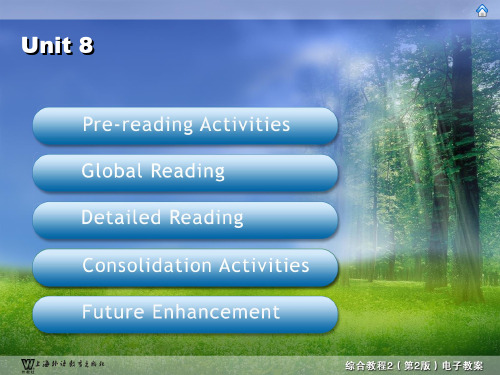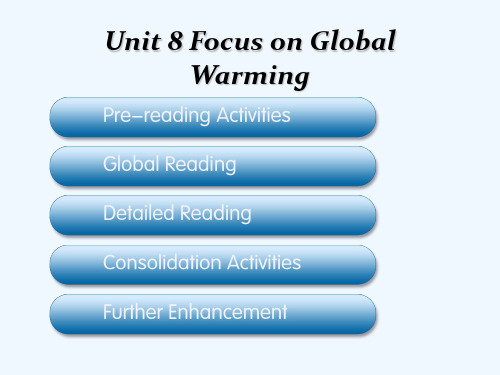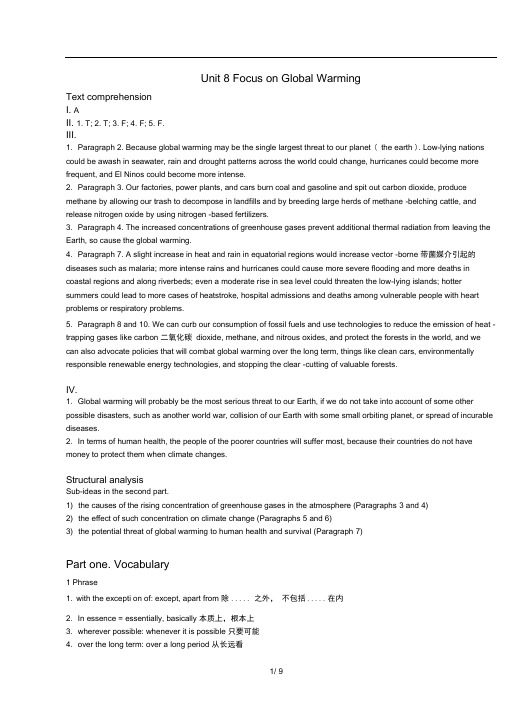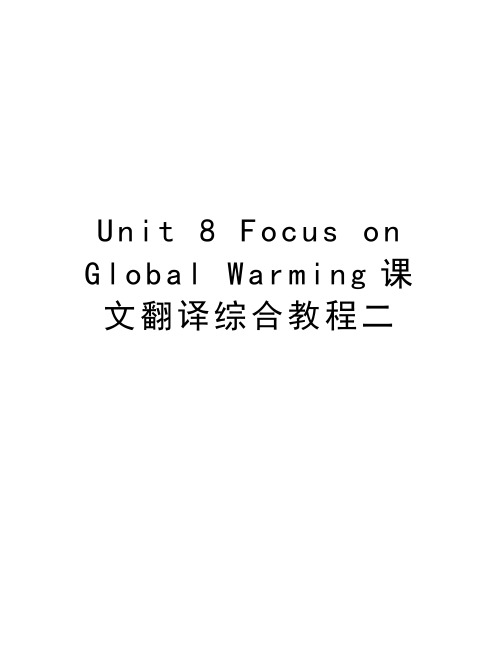综合教程IIUnit 8 Focus on Global Warming 配套练习综合训练
- 格式:pptx
- 大小:371.78 KB
- 文档页数:17




Unit 8 Focus on Global WarmingText comprehensionI. AII. 1. T; 2. T; 3. F; 4. F; 5. F.III.1. Paragraph2. Because global warming may be the single largest threat to our planet ( the earth ). Low-lying nations could be awash in seawater, rain and drought patterns across the world could change, hurricanes could become more frequent, and El Ninos could become more intense.2. Paragraph3. Our factories, power plants, and cars burn coal and gasoline and spit out carbon dioxide, produce methane by allowing our trash to decompose in landfills and by breeding large herds of methane -belching cattle, and release nitrogen oxide by using nitrogen -based fertilizers.3. Paragraph4. The increased concentrations of greenhouse gases prevent additional thermal radiation from leaving the Earth, so cause the global warming.4. Paragraph 7. A slight increase in heat and rain in equatorial regions would increase vector -borne 带菌媒介引起的diseases such as malaria; more intense rains and hurricanes could cause more severe flooding and more deaths in coastal regions and along riverbeds; even a moderate rise in sea level could threaten the low-lying islands; hotter summers could lead to more cases of heatstroke, hospital admissions and deaths among vulnerable people with heart problems or respiratory problems.5. Paragraph 8 and 10. We can curb our consumption of fossil fuels and use technologies to reduce the emission of heat -trapping gases like carbon 二氧化碳dioxide, methane, and nitrous oxides, and protect the forests in the world, and we can also advocate policies that will combat global warming over the long term, things like clean cars, environmentally responsible renewable energy technologies, and stopping the clear -cutting of valuable forests.IV.1. Global warming will probably be the most serious threat to our Earth, if we do not take into account of some other possible disasters, such as another world war, collision of our Earth with some small orbiting planet, or spread of incurable diseases.2. In terms of human health, the people of the poorer countries will suffer most, because their countries do not have money to protect them when climate changes.Structural analysisSub-ideas in the second part.1) the causes of the rising concentration of greenhouse gases in the atmosphere (Paragraphs 3 and 4)2) the effect of such concentration on climate change (Paragraphs 5 and 6)3) the potential threat of global warming to human health and survival (Paragraph 7)Part one. Vocabulary1 Phrase1. with the excepti on of: except, apart from 除..... 之外,不包括..... 在内2. In essence = essentially, basically 本质上,根本上3. wherever possible: whenever it is possible 只要可能4. over the long term: over a long period 从长远看5. alternative = substitutable, different, replaceableII.1. focus;2. much the same;3. consciousness;4. threat;5. deserved;6. decomposed;7. revealed;8. frequent.III. Word derivationFill in the blanks with the appropriate forms of the given words.1. Her natural good sense was improved by the perusal (peruse) of the best books.2. Efforts to reach the injured men have been intensified (intense) because of a sudden deterioration of weather conditions.3. I knew he deserved to be punished but making him stay in every night for a year is a little excessive (excess).4. Theories of the origin of life are partly speculative (speculate), since there is so little direct evidence available.5. This is a book that contains an abundance (abundant) of valuable information.6. The cost of the flights, accommodation and car rental is two thousand dollars inclusive (include).7. When an iron object is heated in a fire, it glows red and emits (emission) radiation.8. We hardly ever go into London. Whatever we need we can buy locally (local).1. peruse v. 熟读,精读perusal n. 熟读,精读;仔细研究e.g. 他每天都要读各种报纸。

U n i t8F o c u s o n G l o b a l W a r m i n g课文翻译综合教程二Unit 8 Focus on Global WarmingJohn WeierTwenty-five years ago if you made a trip to the local library and perused the periodical section for articles on global warming, you’d probably have come up with only a few abstracts from hardcore science journals or maybe a blurb in some esoteric geopolitical magazine. As an Internet search on global warming now attests, the subject has become as rooted in our public consciousness as Madonna2 or microwave cooking.1Perhaps all this attention is deserved. With the possible exception of another world war, giant asteroid, or an incurable plague, global warming may be the single largest threat to our planet.2 For decades human factories and cars have spewed billions of tons of greenhouse gases into the atmosphere, and the climate has begun to show some signs of warming. Many see this as a harbinger of what is to come.3If we don’t curb our greenhouse gas emissions, then low-lying nations could be awash in seawater, rain and drought patterns across the world could change, hurricanes could become more frequent, and El Ninos could become more intense.Our Warming PlanetWhat has worried many people now is that over the past 250 years humans have been artificially raising the concentration of greenhouse gases in the atmosphere. Our factories, power plants, and cars burn coal and gasoline and spit out a seemingly endless stream of carbon dioxide. We produce millions of pounds of methane by allowing our trash to decompose in landfills and by breeding large herds of methane-belching cattle. Nitrogen-based fertilizers, which we use on nearly all our crops, release unnatural amounts of nitrogen oxide into the atmosphere.Once these carbon-based greenhouse gases get into the atmosphere, they stay there for decades or longer. According to the Intergovernmental Panel on Climate Change (IPCC)since the industrial revolution, carbon dioxide levels have increased 31 percent and methane levels have increased 151 percent. Paleoclimate readings taken from fossil records show that these gases, two of the most abundant greenhouse gases, are at their highest levels in the past 420,000 years. Many scientists fear that the increased concentrations of greenhouse gases have prevented additional thermal radiation from leaving the Earth. In essence, these gases are trapping excess heat in the Earth’satmosphere in much the same way that a windshield traps solar energy that enters a car.4Much of the available climate data appear to back these fears.5 Temperature data gathered from many different sources all across the globe show that the surface temperature of the Earth, which includes the lower atmosphere and the surface of the ocean, has risen dramatically over several decades. Worldwide measurements of sea level show a rise of 0.1 to 0.2 meters over the last century. That’s an increase of roughly 1℃ every 4,000 years. Readings gathered from glaciers reveal a steady recession of the world’s continental glaciers. Taken together, all of these data suggest that over the last century the planet has experienced the largest increase in surface temperature in 1,000 years.Not surprisingly, many scientists speculate that such changes in the climate will probably result in hotter days and fewer cool days.6 According to the IPCC, land surface areas will increase in temperature over the summer months much more than the ocean. The mid-latitude to high-latitude regions in the Northern Hemisphere — areas such as the Continental United States, Canada, and Siberia — will likely warm the most. These regions could exceed mean global warming by as much as 40 percent.As far as human health is concerned, those hit hardest will probably be residents of poorer countries that do not have the funds to fend against changes in climate.7 A slight increase in heat and rain in equatorial regions would likely spark an increase in vector-borne diseases such as malaria. More intense rains and hurricanes could cause more severe flooding and more deaths in coastal regions and along riverbeds. Even a moderate rise in sea level could threaten the coastlines of low-lying islands such as the Maldives. All across the globe, hotter summers could lead to more cases of heatstroke and deaths among those who are vulnerable, such as older people with heart problems. The warmer temperatures may also lead to higher levels of near-surface ozone from cars and factories, which would likely cause more perilous air quality days and hospital admissions for those with respiratory problems.Taking ActionsFortunately, we can take actions to slow down global warming.8 Global warming results primarily from human activities that release heat-trapping gases and particles into the air. The most important causes include theburning of fossil fuels such as coal, gas, and oil, and deforestation. To reduce the emission of heat-trapping gases like carbon dioxide, methane, and nitrous oxides, we can curb our consumption of fossil fuels, use technologies that reduce the amount of emissions wherever possible, and protect the forests in the world.We can also do things to mitigate the impacts of global warming and adapt to those most likely to occur,9 e.g., through careful planning and other strategies that reduce our vulnerability to global warming.But we can’t stop there. We are also advocating policies that will combat global warming over the long term, things like clean cars that run on alternative fuels, environmentally responsible renewable energy technologies, and stopping the clear-cutting of valuable forests.Clearly, global warming is a huge problem. It will take everyone —governments, industry, communities and individuals working together to make a real difference. Fortunately you can be part of them.关注全球气候变暖二十五年前,如果你想去当地的图书馆通过各种期刊搜索关于全球气候变暖的文章的话,很可能你只能找到一些刊登在核心自然科学期刊或非常专业的地理科学杂志上的同类文章的摘要。

Unit 8 Focus on Global WarmingWords and Expressions1. peruse vt. to read through something, especially in order to find the part you are interested ine.g. He opened a newspaper and began to peruse the personal ads.Derivation:perusal n.e.g. a brief perusalHe sent a copy of the report to the governors for their perusal.2. periodical n. a publication that appears at fixed intervals, esp. one of a serious kinde.g. She has written for several legal periodicals.Derivation:period n.periodic a. occurring or appearing at (esp. regular) intervals 定期的,周期的periodically ad.3. come up with to think of an idea, plan, reply, etc.e.g. No one has come up with a convincing explanation of why dinosaurs died out.The scientists are beating their brains trying to come up with a solution to the problem.4. attest vt. / vi. to demonstrate, to declare to be truee.g. The luxurious furnishings attested to the family’s wealth.The perfection of their design is attested by the fact that they have survived for thousands of years.Collocation:attest (to) sth.Derivation:attestation n.5. consciousness n.1) the condition of being awake and understanding what is happeninge.g. When will the patient regain his consciousness?The blow caused him to lose consciousness.2) all the ideas, thoughts, feelings, etc. of a person or peoplee.g. Love for freedom runs deep in the national consciousness.This experience helped to change her social consciousness.Collocation:consciousness of sth. / that … awareness of sth. / that …e.g. Her consciousness that she’s different makes her feel uneasy.regain / recover consciousness 恢复意识,恢复知觉lose consciousness 失去意识,失去知觉Antonym:unconsciousnessComparison:subconscious a.潜意识的conscience n.良心conscientious a.(指人或行为)认真的,尽责的6. deserve vt. to be worthy ofe.g.I’m glad she got the first prize at the English Speech Contest —she thoroughly deserved it.I said some cruel things to him, but he deserved it for the way he treated me. Derivation:deserving a.e.g. The money is only given to the most deserving cases — to the people who need it most.His efforts are certainly deserving of praise.7. threat n. a strong possibility that something very bad will happene.g. With so many new offices being built in the city, a lot of archaeological remains are under threat.Drunken drivers pose a serious threat to other road users.Collocation:be under threat of sth.e.g. She left the country under threat of arrest if she returned.Derivation:threaten v.threatening a.8. with the exception of except, not includinge.g. I think every student, with the exception of Helen, will pass the exam.With the exception of gold, the surfaces of metals are never observed but only their oxides.Collocation:without exceptionhave no exceptionexception to sth.make an exception9. spew vt. to pour out, esp. quickly and violentlye.g. One engine of the plane caught fire and spewed black smoke.He spewed forth what he had recently learned about the true facts.Collocation:spew sth. up: to vomit10. harbinger n. something that indicates or foreshadows what is to comee.g. The crowing of the rooster is a harbinger of dawn.Frost is a harbinger of winter.Collocation:harbinger of sb. / sth.11. curb vt. to stop something that is harmfule.g. This government has made pioneering strides towards curbing air pollution.The only way to curb the spread of the disease is by immunizing the entire population.12. emission n. the act of sending forth; dischargee.g.The Green Party have called for a substantial reduction in the emission of greenhouse gases by the UK.Derivation:emit v.e.g. The alarm emits infra-red rays which are used to detect any intruder.The machine emits a high-pitched sound when you press the button.13. concentration n.1) the relative amount of a particular substance contained within a solution or mixture or in a particular volume of spacee.g. The pesticide has reached a dangerous concentration in the lake water.2) (power) of concentrating (on sth.)e.g. I find that yoga improves my powers of concentration.Collocation:concentration on / of sth.14. decompose v.1) (cause to) decaye.g. The meat began to decompose after some time in the sun.2) to separate into components or basic elementse.g. Microbes decompose organic waste into a mixture of methane and carbon dioxide. Derivation:decomposition n.Synonym:decay, rot, break downAntonym:compose15. breedvi. (of animals) produce younge.g. The blackbird, like most birds, breeds in the spring.vt . 1) to keep animals for the purpose of producing young animals in a controlled waye.g. His main income comes from breeding cattle.2) to cause something to happen, usually something bade.g. Unemployment breeds social unrest.Collocation:born and bred: born, brought up and educated (in a specified place or manner)e.g. He was born and bred a gentleman.Derivation:breed n.breeder n.breeding n.16. release vt. let a substance spread into atmosphere, esp. as part of a chemical reactione.g. Oil was released into the sea.An explosion is caused by the very rapid release of a large amount of energy. Collocation:release something into somethingDerivation:release n.17. abundant a. more than enoughe.g. There is abundant evidence of continuing racial prejudice in society.Yunnan has abundant hydropower resources.Derivation:abundantly ad.abundance n.e.g. There was an abundance of wine at the wedding.18. excess a. extra or additional (to the usual or permitted amount)e.g. A company which makes high profits must pay excess profits duty to the government.Collocation:excess fare 补票费excess baggage / luggage超重的行李Comparison:excessive a. greater than what is normal or necessary; extreme 过分的,过度的e.g. Excessive exercise can sometimes cause health problems.Derivation:excess n.exceed v.e.g. The success of our campaign has exceeded our wildest expectations.excessively ad.19. recession n.1) (of water, glacier, etc.) the process of moving back from an area that it was coveringe.g. The rainfall is likely to delay the recession of the floodwater.2) temporary decline in economic activity or prosperitye.g. The economy is in recession and will remain so for at least another year.During severe recession, companies are often forced to make massive job cuts in order to survive.在严重的经济萧条期,公司通常会被迫大规模裁员以维持运转。
具体教案章节:Unit8 Focus on Global Warming一.课时安排:The Teaching Arrangement:1。
Text I (8 period)2. Text II (self study)3. Exercises in the text book (2 periods )4。
Grammar exercises (2 periods)二.教学目的要求:The students are supposed to1。
Grasp the main idea of Text 1 and make clear the structure of the whole passage2. Have a good command of the new words and expressions and make full use of themin the oral communication and writing。
3. Know some different attitudes toward work and leisure between China and westerncountries.三.教学重点:1.The understanding of the text;2.Background knowledge about the global warming;3.The writing style and the techniques;4.Grammar and vocabulary learning。
四.教学难点:1.The use of nonfinite clauses, personal pronouns;2.Paragraph development-grouping details;3.Some difficult sentences。
五.教学内容:Suggestions for Teaching:I.Background informationGlobal warming is the increase in the average temperature of Earth’s near—surface air and oceans since the mid-20th century and its projected continuation. Most of the observed temperature increase since the middle of the 20th century was caused by increasing concentrations of greenhouse gases, which results from human activity such as fossil fuel burning and deforestation。
Unit 8 Focus on Global WarmingKey to the ExercisesText comprehensionI.AII.1. T;2. T;3. F;4. F;5. F.III.1. Paragraph2. Because global warming may be the single largest threat to our planet(the earth). Low-lying nations could be awash in seawater, rain and drought patterns across the world could change, hurricanes could become more frequent, and El Ninos could become more intense.2. Paragraph3. Our factories, power plants, and cars burn coal and gasoline and spit out carbon dioxide, produce methane byallowing our trash to decompose in landfills and by breeding large herds of methane-belching cattle, and release nitrogen oxide by using nitrogen-based fertilizers.3. Paragraph4. The increased concentrations of greenhouse gases prevent additional thermal radiation from leaving the Earth, so cause the global warming.4. Paragraph 7. A slight increase in heat and rain in equatorial regions would increase vector-borne diseases such as malaria; more intense rains and hurricanes could cause more severe flooding and more deaths in coastal regions and along riverbeds; even a moderate rise in sea level could threaten the low-lying islands; hotter summers could lead to more cases of heatstroke, hospital admissions and deaths among vulnerable people with heart problems or respiratory problems.5. Paragraph 8 and 10. We can curb our consumption of fossil fuels and use technologies to reduce the emission of heat-trapping gases like carbon dioxide, methane, and nitrous oxides, and protect the forests in the world, and we can also advocate policies that will combat global warming over the long term, things like clean cars, environmentally responsible renewable energy technologies, and stopping the clear-cuttingof valuable forests.IV.1. Global warming will probably be the most serious threat to our Earth, if we do not take into account of some other possible disasters, such as another world war, collision of our Earth with some small orbiting planet, or spread of incurable diseases.2. In terms of human health, the people of the poorer countries will suffer most, because their countries do not have money to protect them when climate changes.Structural analysisSub-ideas in the second part:1) the causes of the rising concentration of greenhouse gases in the atmosphere (Paragraphs 3 and 4)2) the effect of such concentration on climate change (Paragraphs 5 and 6)3) the potential threat of global warming to human health andsurvival (Paragraph 7)VocabularyI. Phrase1. with the exception of: except, apart from 除……之外,不包括……在内2. In essence = essentially, basically 本质上,根本上3. wherever possible: whenever it is possible 只要可能4. over the long term: over a long period 从长远看5. alternative = substitutable, different, replaceableII.1. focus;2. much the same;3. consciousness;4. threat;5. deserved;6. decomposed;7. revealed;8. frequent.III. Word derivationFill in the blanks with the appropriate forms of the givenwords.1. perusal2. intensified3. excessive4. speculative5. abundance6. inclusive7. emits8. locallyIV.1. A;2. D;3. B;4. C;5. D;6. A;7. C;8. A.V. Synonym / AntonymGive a synonym or an antonym of the word underlined in each sentence in the sense it is used.1. Synonym: mainly, basically, firstly2. Antonym: unfortunately, unluckily3. Antonym: exclude4. Synonym: part, division5. Antonym: decrease, lowering6. Antonym: unavailable7. Synonym: weak, insecure, unsafe8. Antonym: irresponsibleVI. PrefixWrite in each space one word that has the same prefix as underlined in each given word.1. centigrade centimeter2. kilogram kilometer3. synopsis synthetic4. supervise superior5. submarine submerge6. astronaut astronomy7. microbiology microwave8. overwork overloadGrammar ExercisesI. Complete the following sentences using the appropriate verb forms.1. began / / have had2. A: Have has invented4. have have been6. has got (gotten)7. has been8. have forgotten9. B: has goneB: About ten minutes ago.10. wasIII.1. a. simple present form; b. “has obtained”.2. synonymous a. the speaker’s point of view; b. the listener’s perspective.3. a. definite; b. indefinite4. a. still suffering; b. past5. a. on the way or in Italy; b. left Italy.6. a. in the morning; b. after the morning7. a. today is not finished and he may drink more; b. simply happened today.8. a. passed away; b. still living.IV.1. have had – have2. have been – be3. laying – lying4. bore – bear5. Rang – Rung6. rised – risen7. had – hasV. Fill in the blanks with because, as, since, seeing that, for or because of.1. As / Since2. because / as3. As / Since / Seeing that4. because5. because of6. As / Since7. for8. as / because9. because of10. forTranslation exercisesI.1. 到因特网上查一查就可以证明,全球变暖这个主题在公众意识中已经和麦当娜和微波炉一样根深蒂固了。